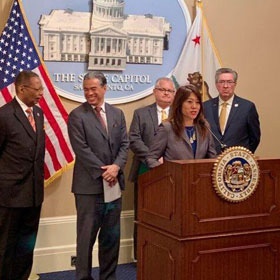February 2019 Articles
Newsletter Downloads
- April 2019
HTML version, PDF version - March 2019
HTML version, PDF version - February 2019
HTML version, PDF version
Nurturing Our Budding Cannabis Industry
February 2019

Helping cannabis businesses establish secure footholds in the now legal adult-use recreational market is a critical focus for Treasurer Ma. She wants to offer these businesses the same fair chance to succeed any start-up industry would receive. So she has been working with legislators to reduce financial stressors that can inhibit the new industry’s growth.
Ultimately, the Treasurer’s goal is to spur a viable industry. To reach that goal means taking action to diminish California’s illicit market, which continues to compete with the legal market. At the same time, we have to find a way to shore up access to banking services.
Despite the legalization of recreational cannabis with passage of Proposition 64, differences in federal and state regulations have fed fears and uncertainties within the banking industry about handling cash associated with cannabis sales and cultivation. Meanwhile, the costs associated with becoming a licensed operator seem to be discouraging some cannabis enterprises from entering the regulated marketplace.
To date, California has issued approximately 10,000 cannabis licenses throughout the state, including to growers. Of an estimated 68,150 growers, only 1 percent to 3 percent are licensed and the rest are still operating in the black market, according to the California Growers Association.1
Not surprisingly, the corresponding revenue generated by the industry also came in well below projections. Tax collections were $101 million below the June 2018 projection for 2017-2018. 2 The state collects an excise tax of 15 percent and a cultivation tax of $9.25 per ounce of cannabis flower under current regulations.
To remedy this imbalance, Treasurer Ma has been working with Assemblymember Rob Bonta (D-Alameda) and other strong legislators to sponsor Assembly Bill 286. If passed, AB 286 would temporarily lower the excise tax on cannabis from 15 percent to 11 percent, and suspend the cultivation tax altogether, through 2022. This reduction is designed to make the legal market more competitive with the illicit market and give gray market operators a reason to join the legal market.

Banking for cannabis businesses will remain a challenge so long as federal law prohibits banks from storing money collected from cannabis-related businesses. Many cannabis businesses have been forced to hold on to large sums of unbanked cash as a result. When transporting this money carriers become targets of crime, turning a “cash only” cannabis business into a public safety issue. For this reason, the cannabis industry is often referred to as “The Wild West.”
In January, Treasurer Ma once again sponsored Senate Bill 51, authored by Senate Majority Leader Robert Hertzberg (D-Van Nuys) to propose a limited purpose state charter bank license for privately funded banks that service licensed cannabis businesses. This bill, too, will encourage the safe integration of gray market cannabis businesses into the legal market.
Treasurer Ma is also proud to collaborate on Assembly Bill 37, authored by Assemblymember Reginald Jones-Sawyer, Sr. This practical legislation allows cannabis businesses to take deductions on their state income taxes for ordinary business expenses such as utilities, employee salaries, health insurance premiums, and rent deductions that most other businesses are already able to take.
We need this change because under Section 280E of the Internal Revenue Code, cannabis businesses are prohibited from deducting these expenses from their state taxes due to the federal classification of cannabis as a Schedule I substance.
Cannabis businesses are at a significant business disadvantage when they are forced to pay taxes on their gross income. Plus, other California businesses will often take such deductions and reinvest the money back into the surrounding community. The cannabis industry should be free to do the same. All cannabis businesses should be allowed a sate tax credit for federal taxes paid on amounts that would otherwise be federally deductible but for 280E compliance.
Going forward Treasurer Ma also plans to work with legislation that would increase access to the Medical Marijuana Identification Card Program by easing the burden caused by access and cost for those who need it most. She is also looking at ways to provide local tax breaks for cannabis cultivation on agricultural land.
Taken together, these measures will help spur growth and contribute greater transparency to this still emerging sector of our economy. There is no one simple fix; we will keep working on several fronts to provide a more comprehensive solution.
That means, of course, also working with the U.S. Congress to speed along the changes we need. On February 13, Treasurer Ma testified before the House Financial Services Committee, Subcommittee on Consumer Protection & Financial Institutions on the need to improve banking services for cannabis-related businesses. Here is a link to a video of the subcommittee hearing (fast forward to 25:54 for the relevant portion of the hearing): https://youtu.be/kW7fWM04Uyc?t=1554.
Stay tuned!
1“An Emerging Crisis: Barriers to Entry in California Cannabis.” California Growers Association, February 19, 2018. https://d3n8a8pro7vhmx.cloudfront.net/emeraldgrowers/pages/3249/attachments/original/1519106158/An_Emerging_Crisis.pdf?1519106158
2Kerstein, Seth, “Cannabis Tax Revenue Update.” California Legislative Analyst’s Office, November 15, 2018. https://lao.ca.gov/LAOEconTax/Article/Detail/326





